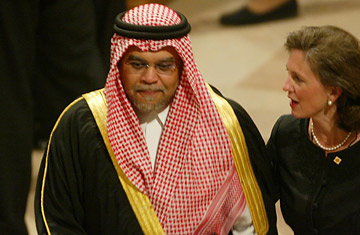
Prince Bandar bin Sultan bin Abdul Aziz al-Saud
When Britain's law enforcement authorities began probing allegations that the leading British arms manufacturer had paid bribes to a senior Saudi official, then Prime Minister Tony Blair called a halt to the probe. Its continuation, he warned, would jeopardize British national interests. But the same allegations have resurfaced at the center of an investigation by the U.S. Department of Justice, with potentially explosive consequences.
The Saudi leader at the center of the investigation is Prince Bandar bin-Sultan, who in 2005 wrapped up more than 20 years service as the Kingdom's ambassador in Washington, D.C. Widely praised as an astute player on the global diplomatic stage, Bandar — also known for his intimate access to the highest levels of the U.S. government and his friendship with both President Bush and his father, former President George H. W. Bush — assumed a less visible role as a top national security advisor to the Saudi ruler, King Abdullah.
On June 7, a British Broadcasting Corporation report claimed that Bandar had received secret payments totaling more than $2 billion over a ten-year period from British Aerospace Systems (BAE), Europe's largest arms maker — and also a company that earned roughly close to half of its 2006 revenue in supplying the U.S. These payments were made over a period in which the British company negotiated massive contracts to supply Saudi Arabia. Both BAE and Bandar have categorically denied the allegation of any wrongdoing, claiming they acted properly and lawfully at all times. Bandar has admitted that the money came into accounts related to his signature at the now-defunct Riggs Bank in Washington, D.C., but says these were official Saudi accounts rather than personal ones, and that all the payments went to the Saudi government.
Although the British inquiry was halted late in 2006 on the grounds that it would jeopardize British national security — the government of then-Prime Minister Tony Blair warned that its continuation could cost thousands of British jobs and imperil intelligence ties with the Saudis — BAE revealed this week that it is now under investigation by the U.S. Department of Justice. The DoJ, according to a statement by BAE, is examining the company's compliance with U.S. anti-corruption laws in its business deals "concerning the Kingdom of Saudi Arabia." The American investigation appears to center around the fact that BAE used the U.S. banking system to make large regular payments to accounts controlled by Bandar.
Whatever the outcome of the DoJ inquiry, the fact that it is taking place at all means that more damaging revelations could lie ahead. Among those agitating to know more is Democratic senator John Kerry, who recently wrote to Attorney General Alberto Gonzales citing a 2002 State Department memorandum on "persistent allegations that BAE Systems pays bribes to obtain business." The State memorandum concluded that "this volume of allegations about one company would have triggered a Department of Justice criminal division investigation long ago." Kerry's letter, which asks for information on how DoJ is handling the BAE matter, also refers to a high-ranking DoJ official who said in 2006 that foreign-owned companies, such as BAE, could be targeted by U.S. investigators.
None of the questions over the British arms manufacturer appears to have had any impact on the Committee on Foreign Investment in the United States, or CFIUS, which last week approved BAE's $4.1 billion bid to acquire Armor Holdings, the Florida-based contractor that makes armor for Humvees and Stryker vehicles. CFIUS , an inter-agency panel which includes a representative of the Justice Department, ruled that Armor's transfer to foreign ownership would not threaten U.S. national security.
The fact that BAE won CFIUS approval for a major acquisition only days before its disclosure of the Justice Department investigation has certainly raised eyebrows in Washington. "If the Justice Department were to find that BAE had committed a significant violation of the Foreign Corrupt Practices Act, it would automatically raise questions about how rigorously the company is safe-guarding classified information, adhering to export controls and meeting its other obligations under U.S. law," says a leading Washington expert in the area, who did not want his name used because of the political sensitivity of the topic.
Allegations of bribery against BAE began surfacing in London in the late 1980's, in connection with the $85 billion al-Yamamah weapons-for-oil deal under which BAE agreed, in 1985, to supply Tornado jets and other military equipment to Saudi Arabia. But it was many years before Britain's Serious Fraud Office began to investigate, and its inquiry was brought to an abrupt halt by the Blair government in December 2006. The stated reason — that the probe could cost British jobs and imperil important ties — carried the obvious implication was that Britain could not afford allow awkward truths about BAE conduct to become public, presumably because of the anticipated reaction of the Saudis. But that which the Blair government had sought to keep under wraps may now be in danger of being exposed by Britain's — and Saudi Arabia's — most important ally, the government of the U.S.
